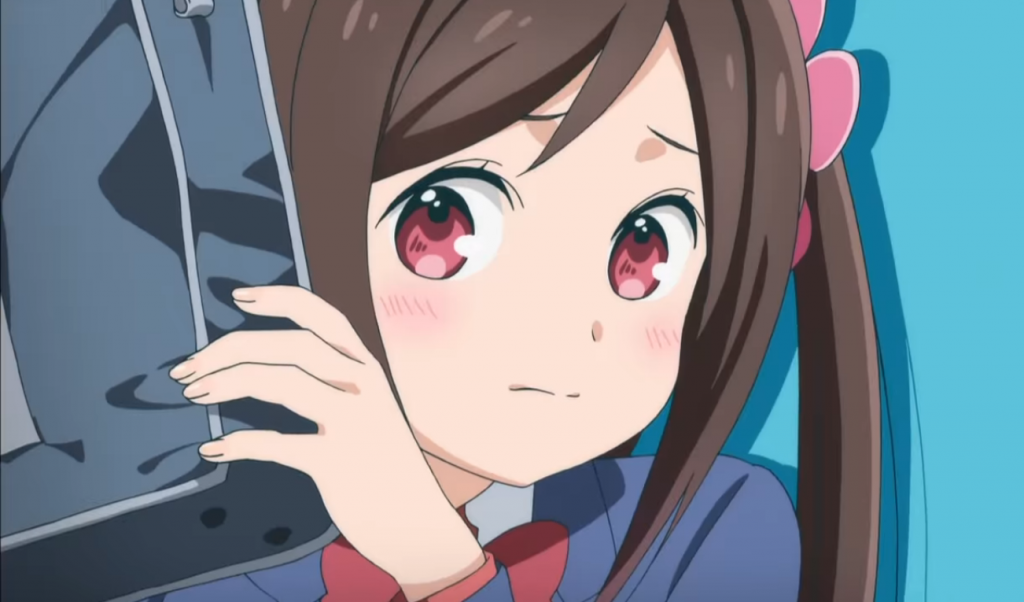
While my experiences as an autistic woman primarily shape what I write on my blog, this is not the only form of neurodivergence I experience in my life. I have also experienced both general and social anxiety in my life, and it is safe for me to say that the latter can be far more overwhelming than the former, especially since I am also on the autistic spectrum. Social anxiety has made it difficult for me to try and open up and make connections with other people, as it negatively impacts the way I view myself and how I believe other people perceive me. I will commonly find myself evaluating and re-evaluating how a specific social interaction took place, criticising myself at what I believed to be a poor job of communicating, and feeling embarrassed for myself afterwards. While I am aware that the vast majority of people experience difficulties in communicating at some points in their lives, my social anxiety tricks me into believing I am the only person who is capable of messing up at social interactions, and that my socialization skills are among the absolute worst.
Finding a way to properly articulate these feelings is difficult enough, but to actually have these feelings be legitimized is especially challenging. As many neurodivergent and mentally ill people can attest, describing our experiences to neurotypical people is extremely difficult. This is probably because to neurotypicals our experiences are not “legitimate” concerns, because they are “all in the mind”, or we are “just over-exaggerating”, and if we just do a specific set of activities we’ll feel better in no time. So finding stories able to showcase our point of view, and present our experiences in a sympathetic light, is something extremely surprising and validating to find.
This year two series in particular stood out to me in their portrayal of social anxiety in media: Hitori Bocchi no Marumaru Seikatsu (or Hitori Bocchi for short) and Moominvalley. Both series have main characters who clearly exhibit explicit, or heavily implied, social anxiety in numerous episodes of their respective series. Additionally the anxiety is portrayed in an empathetic manner, with the audience meant to empathize with the characters’ experiences as opposed to merely dismissing them. These next two weeks I will look at how these two series portrayed social anxiety, and how these depictions made me feel validated. This week I will focus my attention on Hitori Bocchi and its protagonist, Hitori Bocchi.
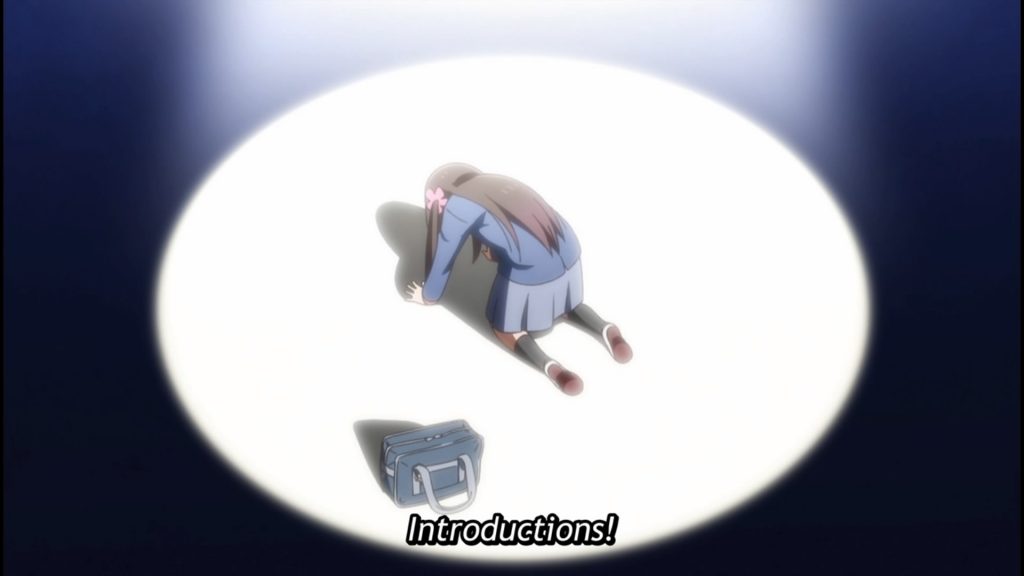
Hitori Bocchi no Marumaru Seikatsu, which loosely translates into either Hitori Bocchi’s Life or The Life of Being Alone, centers on Hitori Bocchi, a Japanese middle-school girl who experiences extreme social anxiety, and whose name derives from the Japanese expression hitoribocchi (ひとりぼっち), which means “all alone”. To make matters worse, she is entering middle-school without any of her elementary school friends accompanying her, which makes her feel even more alone and anxious about an already stressful life change. Seeing this her best friend from elementary school, Kai, gives Bocchi a goal to strive for: to befriend all of the people in her homeroom class or Bocchi will never be friends with Kai again…which to be clear is not a good strategy to implement in real life! And so, with this objective in mind, Bocchi does her best to try and make friends with all of her classmates.
What is particularly interesting about this show is that the entire focus of the series is on Bocchi’s social anxiety. The central conflict of each episode revolves around Bocchi trying to navigate through her daily life, and achieve her goal to make friends, all while experiencing social anxiety. Additionally, while Bocchi’s anxiety does lessen to a noticeable degree as the series progresses, and she makes a few new friends, her social anxiety does not magically disappear by the end of the show. The show’s continued focus on Bocchi’s struggles demonstrates to the audience that social anxiety is not merely an issue of “just being shy” that can be fixed after making more friends. The message instead is that social anxiety is something that Bocchi will always experience, but she is capable of developing ways to manage her stress and gain more self-confidence in her social interactions, which is a very positive message to see displayed in a piece of media.
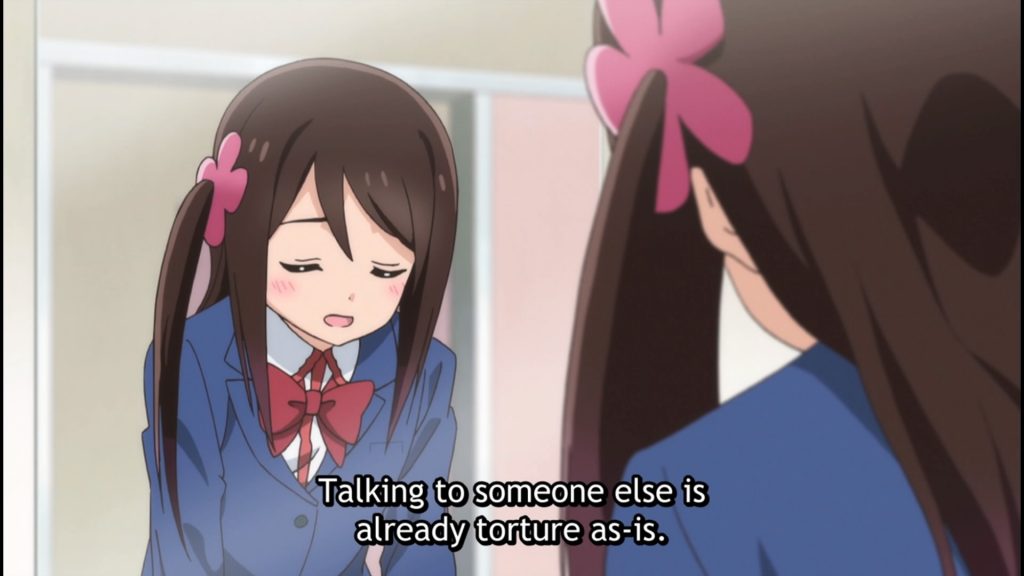
Another surprising quality of the show is how Bocchi’s struggles are not trivialized within the series. This is something that could have easily occurred seeing as the series is part of the comedy genre, and more often than not comedies will tend to over-exaggerate or diminish neurodivergencies for the sake of an easy, if hurtful, joke. While the series does occasionally frame some instances of Bocchi’s anxiety as a joke, they are not cruel or malicious in their execution. Instead there is a strong emphasis throughout the series on creating empathy between the viewer and the character, by showcasing Bocchi’s thoughts as well as the physical side-effects anxiety has on her body.
Bocchi’s thought processes are shown through her internal monologues, a constant element in the series. Through here we learn about Bocchi’s struggles with trying to approach others, even after she tries her best to think positive mantras, or how her small fears can develop into huge horrors when her anxiety causes her mind to spiral out of control. Meanwhile her physical symptoms of anxiety manifest in a variety of different ways in the series, from her body shaking, feeling frozen with fear, or occasional bouts of stress-induced vomiting. These provide the audience with a visual insight into how social anxiety can affect the mind and body, which in turn legitimizes the experiences of people who experience it firsthand.
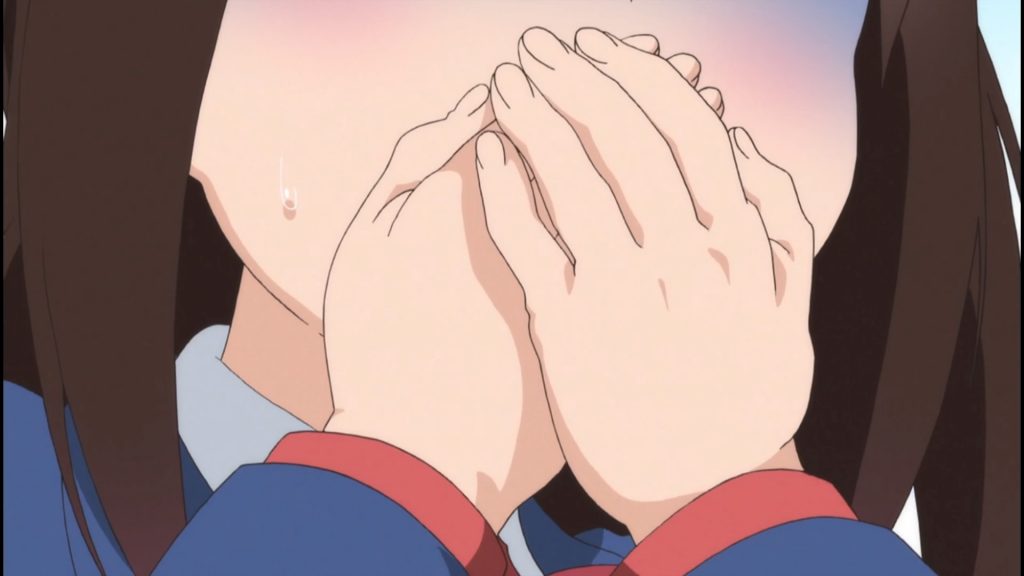
The final great achievement of Hitori Bocchi is Bocchi’s friendships with her classmates. Throughout the course of the series Bocchi makes three very close friends, who soon become her new best friends. Once these girls get to know Bocchi better they recognize her anxiety for what it is and do not admonish her for it. Instead they help her develop strategies to connect with her other classmates, try to mitigate her stress, support her in her efforts, and overall provide her with positive reinforcement and kindness.

The series also shows that this kindness goes both ways, as Bocchi helps her friends in various different scenarios throughout the series. The most noticeable example in this is how she tries to teach her friends various different skills, like teaching one friend how to swim, or her classmates how to make origami art. As is typical for a lot of people who experience anxiety, Bocchi does not entirely realize how her acts of kindness are received by her friends, or know how much they value her friendship. Thankfully, Bocchi’s friends recognize this aspect of her character too, and make sure to make efforts to express to her how much they love and care for her in a way that she will comprehend. This showcases that people with anxiety are not merely “burdens”, but rather are people with their own skills who need additional patience or supports, and who are more than deserving of friendship.
Overall, this series makes me feel hopeful for the possibility of social anxiety being more widely understood and supported. Perhaps this series could teach neurotypical audiences more about social anxiety and foster more empathy for those of us who live very similar lives to Bocchi. But overall, I hope that series like Hitori Bocchi help people with social anxiety feel like they are not alone in their experiences. Hitori Bocchi’s experiences with anxiety resonated with me, even when our symptoms and coping mechanisms were different, because I still could identify where her emotions were coming from and empathized with the impact they have on a person. Watching her experience anxiety, but continue to persevere, was extremely validating and uplifting for me to experience. Positive messages like this need to continue, to help reassure people like us and provide us with hope for a better future.
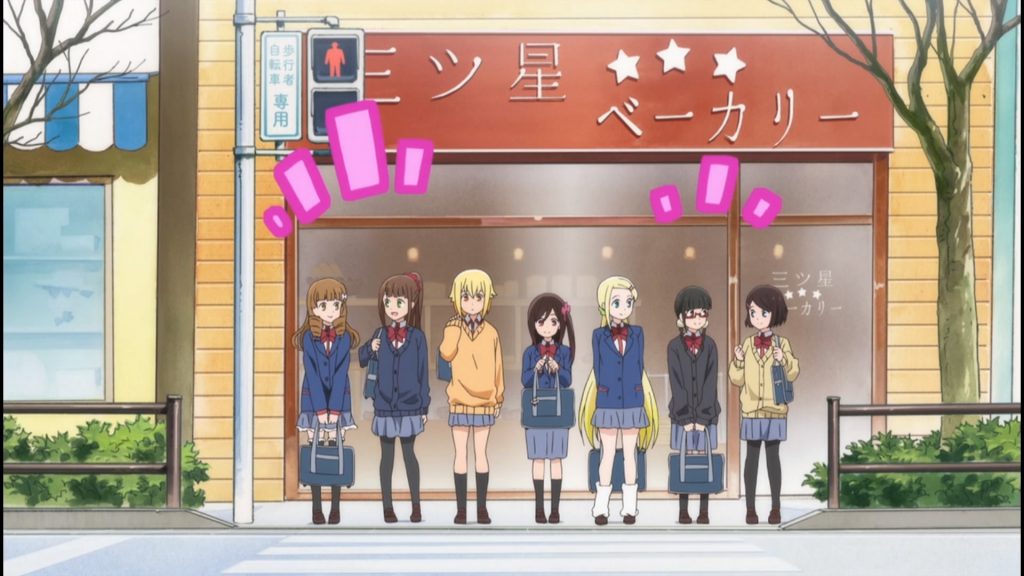
Next week I will examine the character of Snufkin from the series Moominvalley, and discuss how his experiences showcase a different side of social anxiety.